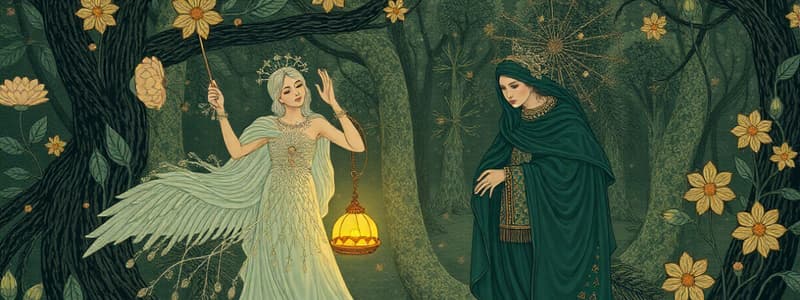Podcast
Questions and Answers
What do anthropologists do to become a part of their surroundings?
What do anthropologists do to become a part of their surroundings?
- Observe and participate in daily activities. (correct)
- Conduct laboratory experiments.
- Isolate themselves to remain objective.
- Analyze historical documents.
What is one function of stories in some societies?
What is one function of stories in some societies?
- To encourage innovation and change.
- To promote individual freedom.
- To document scientific discoveries.
- To apply social pressure and keep people in line. (correct)
What is a common characteristic of fables?
What is a common characteristic of fables?
- They describe complex scientific theories.
- They set an example for how to act in a dangerous situation. (correct)
- They promote technological advancements.
- They document historical events.
What is a key aspect of storytelling?
What is a key aspect of storytelling?
What does 'The Other' describe?
What does 'The Other' describe?
How did early anthropologists gather information?
How did early anthropologists gather information?
What is a characteristic of 'armchair' anthropology?
What is a characteristic of 'armchair' anthropology?
What is ethnocentrism?
What is ethnocentrism?
What was a common feature of early anthropological studies during the colonial era?
What was a common feature of early anthropological studies during the colonial era?
During what era did European countries assert control over land in Asia, Africa, and the Americas?
During what era did European countries assert control over land in Asia, Africa, and the Americas?
What kind of interpretation did early anthropological studies often present?
What kind of interpretation did early anthropological studies often present?
What is implied when other cultures are considered 'primitive'?
What is implied when other cultures are considered 'primitive'?
What is the role of anthropologists in understanding cultures?
What is the role of anthropologists in understanding cultures?
What is a main function of stories?
What is a main function of stories?
What do fables often do?
What do fables often do?
What is storytelling used for?
What is storytelling used for?
What is one of the limitations of armchair anthropology?
What is one of the limitations of armchair anthropology?
What does ethnocentrism lead to?
What does ethnocentrism lead to?
What did European countries use as a measuring stick to judge others?
What did European countries use as a measuring stick to judge others?
What does the term 'primitive' suggest about cultures?
What does the term 'primitive' suggest about cultures?
Flashcards
Anthropologists
Anthropologists
Becoming part of a community, observing daily life.
Stories in Culture
Stories in Culture
Stories pass on tradition and cultural values to connect people to the past.
Fables
Fables
Stories with a moral; set examples.
Storytelling
Storytelling
Signup and view all the flashcards
"The Other"
"The Other"
Signup and view all the flashcards
Early Anthropologists
Early Anthropologists
Signup and view all the flashcards
Armchair Anthropology
Armchair Anthropology
Signup and view all the flashcards
Ethnocentrism
Ethnocentrism
Signup and view all the flashcards
Early Anthropological Studies
Early Anthropological Studies
Signup and view all the flashcards
Study Notes
- Anthropologists immerse themselves in their surroundings through observation and participation in daily activities
Stories
- Stories are a key aspect of culture, connecting people to the past by passing on traditions and cultural values.
- Certain societies use stories to exert social pressure and influence behavior and thought.
- Stories can act as a form of social control by addressing prohibited activities or customs.
- Different cultures may share similar themes in their stories.
- The quest narrative often involves characters journeying to distant lands, encountering hardships, opportunities, and real-life situations.
- Stories reinforce religious, social, political, and economic norms across generations
- Stories exert social pressure and influence behavior and thought.
Fables
- Fables resemble stories, offering examples for navigating life or outlining behavior in dangerous situations.
- They can be part of traditions, helping to preserve ways of life or explain mysteries.
- A fable becomes a recognized tradition when it's retold and embraced by a community.
Storytelling
- Storytelling appears in various forms, like tall tales and folktales.
- Used for entertainment or discussing life's problems.
- Functions as cultural preservation, used to communicate morals and values to the next generation.
The Other
- Refers to people whose customs, beliefs, or behaviors are "different".
- Considered as an anthropological concept
Early Anthropologists
- Early Anthropologists studied people from other civilizations, relying on written accounts and opinions of others.
- They developed stories about other cultures based solely on information gathered by others.
- They did not have any direct contact with the people they studied
Armchair Anthropology
- When a culture is viewed from a distance, anthropologists may measure it from their own vantage point.
- This can lead to comparisons that position the anthropologist's culture as superior.
- Armchair anthropologists were often unaware of their ethnocentric biases due to their lack of direct engagement with the cultures they studied.
Ethnocentrism
- Ethnocentrism is the belief that one's own group or culture is superior to others.
Early Anthropological Studies
- Early anthropological studies often presented biased, ethnocentric interpretations of the human condition.
- From the 16th to the mid-20th century, European countries like Britain, France, and Spain controlled land in Asia, Africa, and the Americas.
- European notions of right and wrong served as a standard for judging other cultures.
- Non-European cultures were deemed primitive, was an ethnocentric term.
- The term "primitive" suggests indigenous cultures lacked technological advancement.
Studying That Suits You
Use AI to generate personalized quizzes and flashcards to suit your learning preferences.




